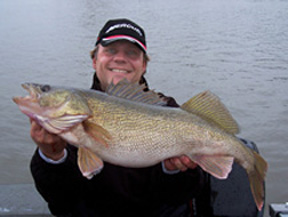|
|
Member
Posts: 185
Location: Port Washington, wisconsin | Has anyone a suggestion on simplifying the tangled mess of wire on a 24 volt trolling motor system? With all the other connections, locater, on board charger, etc. it is a project for me to get them all off the posts for storage, and then get them on fast, and correct, when spring comes. |
|
| |
|

Member
Posts: 2393
Location: Waukesha Wisconsin | Two options
http://www.basspro.com/servlet/catalog.TextId?hvarTextId=5203&hvarD...
http://www.basspro.com/servlet/catalog.TextId?hvarTextId=58542&hvar...
|
|
| |
|
Member
Posts: 129
| The batery terminals that Dennis recommended work well. Another thing that works is to run a zip tie through the terminal ends or around the wires to keep them seperated.
Tim |
|
| |
|
| Bagz..
For 24V troll plug and a 2 bank onboard charger...All you should end up with on your troll motor batteries is two wires per post...including the jumper wire between your two batteries.
If you have battery meter guages...then, one more wire per post. |
|
| |
|
| wrong answer there t mac. boats using a 24 volt system do not use a jumper wire between the batterries. the male plug (on your trolling motor) has an internal jumper wire to put the batterries in series and give you 24 volts. that is why have the mess of wires to deal with. this set up also lets you use 12 volt accessories by using a different male plug without the internal jumper wire. |
|
| |
|
| .. well... that is one system.
That is the "Rig-Rite" system and Lund boats came with them for several years. In our shop, we have installed many "Rig-Rite" systems on non Lunds, too. Still a good system, but uses more wires than what is currently used on new Lund (and Ranger) boats.
The system currently being used incorporates less wires.
Using a "Marinco" receptacle and male plug, and by incorporating a jumper, or jumpers we now have 12-24-or 36v capability at the receptacle...with less wires on the battery terminals.  |
|
| |
|

Member
Posts: 3899
| I have a 2002 Lund, and it uses a jumper between the two batterys, so I guess that would make T-Mac right.
Also, why are you taking your batteries out in the first place? Charge them up, and they'll be fine over winter. |
|
| |
|
| Actually, they are both right. Both systems are in use on a variety of boats. The one without the jumper wire at the batteries gives you the flexibility to use 12 or 24 volt accessories. I can plug in a 12 volt spotlight to my trolling motor receptacle or use my 24 volt trolling motor, providing I have the correct male plug. The system with the jumper at the batteries has fewer wires to deal with and may save the boat manufacturer $5 in wire. |
|
| |
|
| Both systems allow you to charge individual batteries at 12V or to take 12 volts from whatever battery you want to, to use however you want. (or 24v, for that matter).
One system saves wires.... and is why I responded
Either system is fine. Both are tried and proven.
However, the system that incorporates jumper wires was not put on boats to save money. It was needed for today's bigger thrust troll motors.
While this "Marinco" system uses less wires...they are heavier wires. Plus, the plug and receptacle cost about double what the "Rig-Rite" parts do. |
|
| |
|
Member
Posts: 859
Location: Appleton wi | marinco connector is the way to go its alittel more expensive but if your doing this way it looks alot more proffesional and its alittle more versatile. The part # 2018br for the female end . If you jumper at the batterie you wont have a option for 12 volt if needed at the female connector (spot light or whatever) no matter what connector you use. By using the Marinco you can plug either 12v or 24v into the female connector once its wired properly.They have a website.
Edited by eye Lunker 11/5/2005 6:17 PM
|
|
| |
|
| if you are running only a 24v system get rid of that 12/24 volt setup and run 2 6 ga leads with a jumper between the batteries to make your series connection.
you will be way ahead in the end. The 12/24v setup uses 10ga wire and has twice as long a path for the current to travel leading to voltage drop and power loss. the current has to run from batt 1 to the trolling motor plug, through the connector and that jumper in the plug, back to battery 2, than back up to the motor again.
I left the 10ga wiring in place in case I need to us if for sometihg else. |
|
| |
 24v wiring
24v wiring 24v wiring
24v wiring